#android app developer company
Explore tagged Tumblr posts
Text
0 notes
Text
Android App Development by Infinity Webinfo Pvt Ltd

In the rapidly evolving digital world, mobile applications have become a cornerstone for businesses seeking to establish a strong online presence. At INFINITY WEBINFO PVT LTD, we specialize in Android development, delivering robust and scalable solutions that cater to diverse industries. Our expertise as a app developer and designer extends seamlessly into the mobile app domain, ensuring that your business reaches its audience across all platforms.
Why Choose Infinity Webinfo Pvt Ltd for Android App Development?
Expertise and Experience Infinity Webinfo Pvt Ltd boasts a team of seasoned developers proficient in Java, Kotlin, and other essential tools for Android app development. Their in-depth knowledge ensures high-quality, scalable, and performance-driven apps tailored to specific client requirements.
Customized Solutions The company specializes in creating bespoke applications that align with the unique goals and visions of each business. From e-commerce to healthcare, Infinity Webinfo Pvt Ltd crafts apps that resonate with the target audience.
Cutting-Edge Technology Staying updated with the latest technological advancements, the team leverages AI, ML, IoT, and cloud integration to create future-ready applications.
Integrated Approach As a leading app developer and designer, we offer an integrated approach that harmonizes your app with your app. This ensures a consistent brand experience across all platforms.
User-Centric Design Understanding the importance of user experience, Infinity Webinfo Pvt Ltd focuses on intuitive and aesthetically pleasing designs. They ensure seamless navigation and functionality to keep users engaged.
Services Offered in Android App Development
1. Native Android App Development With a focus on harnessing the full potential of Android’s ecosystem, the team delivers apps with robust performance and exceptional user experience.
2. Enterprise App Development Infinity Webinfo Pvt Ltd helps businesses optimize their processes by developing enterprise-grade applications tailored to their operational needs.
3. E-commerce Solutions From shopping platforms to payment gateways, the company builds secure and feature-rich e-commerce applications.
4. Maintenance and Support The team provides comprehensive post-launch support, ensuring apps remain updated and perform flawlessly over time.
5. Integration of Advanced Features Infinity Webinfo Pvt Ltd incorporates advanced functionalities like real-time chat, push notifications, geolocation services, and AR/VR to enhance app capabilities.
Process of Android App Development
Requirement Analysis: Understanding the client’s vision, goals, and target audience.
Design and Prototyping: Creating wireframes and mockups for approval.
Development: Coding the app using best practices for performance and security.
Testing: Conducting rigorous quality assurance to eliminate bugs and ensure a smooth user experience.
Deployment: Launching the app on the Google Play Store.
Post-Launch Support: Monitoring performance and implementing updates as needed.
Expertise Across Industries
Our Android development services are tailored to meet the unique needs of various sectors, including:
1. Travel Agency Online Development
The travel industry thrives on accessibility and convenience. Our team develops feature-rich Android apps for travel agencies, integrating advanced functionalities like real-time booking, payment gateways, and location-based services. Whether you're a startup or an established travel app developer, our solutions can enhance your online business.
2. Education Website and App Development
The education sector has embraced digital transformation, and we are at the forefront of this revolution. From virtual classrooms to learning management systems, our Android apps are designed to make education accessible and engaging. As an experienced education app developer, we bring the same level of innovation to Android platforms.
3. B2B and B2C Development
Businesses need efficient tools to connect with partners and customers. Our Android applications cater to both B2B and B2C developers, offering custom features like secure data sharing, user-friendly interfaces, and scalable architecture. These apps empower businesses to operate seamlessly and grow their networks.
Some Other Industries
Healthcare: Telemedicine apps, fitness trackers, and patient management solutions.
Retail: E-commerce and inventory management applications.
Finance: Mobile banking and investment tracking apps.
Conclusion
Infinity Webinfo Pvt Ltd is a trusted partner for businesses looking to create impactful Android applications. With a customer-focused approach and commitment to excellence, the company continues to empower organizations through innovative and reliable mobile solutions. Whether you’re a startup or an established enterprise, Infinity Webinfo Pvt Ltd has the expertise to bring your Android app vision to life.
Mobile: - +91 9711090237
#android#android app development#android app developer company#android app developers#infinity webinfo pvt ltd#travel portal company#travel portal development#travel portal solutions
1 note
·
View note
Text
Android Studio Tips and Tricks for Efficiently Managing Project Dependencies
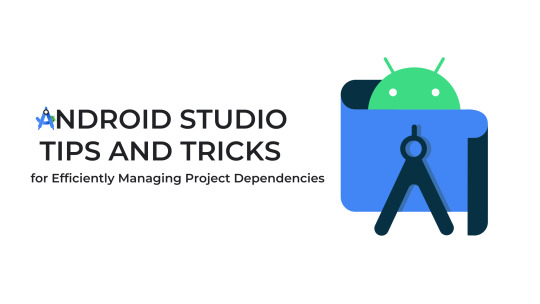
No matter how efficient a developer is, everyone comes across a moment when they feel miserable managing the Android app dependencies. This feeling could arise for multiple reasons. Maybe they are setting up a new project, and some dependencies are incompatible with the module. Maybe their version expired or something else. This blog shares some tips and tricks for dealing with project dependencies.
Refer to These 5 Android Studio Tips and Tricks to Manage Dependencies
It is hard to imagine the Android app development project's success with incompatible libraries, plugins, and functionalities. We must adapt and implement some approaches to maintain reliability, agility, and efficiency. These Android Studio Tips and Tricks a developer generally prefer mentioned below:
Project Modularization
No project becomes a reality overnight; you must have built different sections independently. For each one, you have a configured features file. Whenever an issue occurs in any app section, you can navigate to that file to make the necessary adjustments in feature dependencies. However, coating hard code could be problematic for some projects. We suggest prioritizing modularization to manage your app code and dependencies perfectly. It will manage duplicity, code organization, and app structure.
Creating Separate Build.gradle Files
Each project module is developed keeping the specific context or feature in mind; thus it’s better to store the relevant dependencies in a separate build. Gradle files. It could be related to UI/ UX, networking compatibility, or other important parts of the projects. Creating such files makes dependencies organization manageable.
Gradle Version Catalogs
If you are accessing Gradle 7.0, it has some exciting features to manage project dependencies. It avoids conflicts, driving efficiency and consistency. You can modify and share, centralizing the dependencies. Also, it enables access to third-party plugins for additional functionality support and drive automation. Define the version for each project and create library bundles. It improves the build time, optimizing performance and efficiency.
BuildSrc Directory
Each Android project has a directory called buildSrc. So many things are ongoing to build the product, like access of custom plugins, configuring dependencies, and customizing functionality tasks. Gradle build is responsible for automatically compiling and interpreting all the classes and scripts. The best thing about this Gradle build process is that it keeps the project code organized and manageable. You can refer it in future for a quick modification to existing projects or to reuse in new projects. Moreover, what attracts the developer here is its rapid auto edit and synchronization of code to the buildSrc folder, keeping the logic up-to-date.
Default Implementation Through Build.gradle File
We are listing it last as it's not a best practice. However, for small-level projects that don’t need frequent upgrades, it can work for apps with basic features. So, in this practice, all the dependencies are put together in build.gradle. Also, we don't need to launch any tools here. Furthermore, if at some point you need to modify, you need to do it manually. Due to the discomfort of duplicate files and the inflexibility to experiment it isn’t preferred much.
Wrap Up:
When initiating an Custom Android app development project, each action impacts its success. As a developer, you must know some Android Studio tips and tricks along with hands-on experience on Gradle. Ti support is used to automatically optimize and manage dependencies. Before taking any approach mentioned in this blog, consider your project requirements, complexity, and size, as each one delivers different results with proper code organization.
#android app development#android studio#android app developer company#Android app development company
0 notes
Text
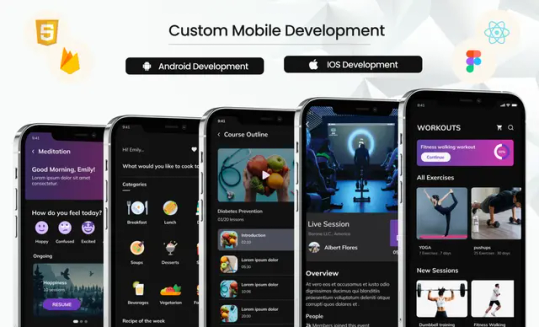
I will do mobile app development, ios mobile App Android mobile app development
Hi,
Are you looking to digitize your business or have an innovative idea for a mobile app? I'm a full-time Mobile App Developer, along with my expert and dedicated team of developers and designers offer Mobile App Development (Android & IOS) and UI/UX design services. I've 5 years of working experience with many clients worldwide.
Our Development Plan Phases
Mobile App Design designed in Adobe XD/ Figma
Front End Development of Mobile Apps coded in React Native
Backend Apis Development in Node JS
Admin Panel Integration in Apps
Deployment of both Mobile apps on Appstore and Playstore
Developed iOS and Android applications for various industries :
Food Ordering application
On-Demand application
Taxi Booking application
Social iPhone application
Finance iPhone application
Health and Fitness application
How to get started?
Please send me
Description of your app idea
Any resembling website, wireframe design to follow
Any helpful material
If you don't have your requirements ready, you can reach out us for a free consultation.
This gig is for apps that are between 5 to 7 screens. Consult before placing your order.
#app development#app developers#mobile app development#android app development#android app developer company#ios app development#ios#mobile app design#android application development
0 notes
Text
Sparking Young Minds: Building a Fun and Engaging Robotics Curriculum for Primary School

By introducing robotics at this stage, we can ignite a passion for Science, Technology, Engineering, and Mathematics (STEM) in young minds. This article explores the benefits of incorporating a robotics program into your primary school curriculum and provides practical tips to get you started.
Why Robotics in Primary School?

Integrating robotics has numerous advantages that extend far beyond building robots. It fosters:
Critical Thinking and Problem-Solving: Students learn to break down challenges into smaller steps, experiment with solutions, and adjust their approach as needed. This iterative process builds valuable problem-solving skills applicable across all subjects.
Creativity and Innovation: Robotics encourages children to think outside the box. They use their imaginations to design robots for specific tasks and then translate those ideas into reality.
Collaboration and Teamwork: Many robotics projects involve teamwork. Students learn to communicate effectively, share ideas, and work together towards a common goal. This fosters cooperation and builds strong interpersonal skills.
Computational Thinking: At its core, robotics involves programming robots to perform specific actions. Even at a basic level, this introduces children to the logic and concepts behind coding, a crucial skill in today’s world.
Confidence and Self-Esteem: Successfully completing a robotics project can be incredibly rewarding for young students. It boosts their confidence and fosters a sense of accomplishment.
Building a Fun and Engaging Robotics Curriculum

1. Choose Age-Appropriate Tools and Kits:
For young children, simpler robotics kits are ideal. Look for age-specific options that utilize block-based programming��or visual coding interfaces. These platforms allow students to focus on the concepts and problem-solving aspects without getting bogged down by complex coding languages.
There are many fantastic educational robotics kits available, such as Lego Mindstorms Education EV3 and Thymio. Consider factors like budget, class size, project complexity, and desired learning outcomes when choosing a kit.
2. Start with Simple Projects:
Don’t overwhelm students with complicated tasks right away. Begin with introductory projects that build upon each other. Here are some ideas to get you started:
Line Following Robot: This classic project teaches students about sensors, motors, and basic programming concepts. Students can build a robot that follows a black line drawn on the floor.
Maze Solving Robot: Building upon the Line Following project, students program a robot to navigate a maze. This adds a layer of complexity and encourages strategic thinking.
Obstacle Avoiding Robot: Introduce obstacle sensors and programming for conditional actions. Students create a robot that detects and avoids obstacles on its path.
Creative Expression Projects: Let students unleash their creativity by designing robots with specific functions, like robots that draw simple shapes or play a simple melody.
3. Integrate Robotics with Other Subjects:
Robotics isn’t a standalone subject. Integrate projects with existing curriculum to reinforce learning across different areas. Use robotics to:
Science: Explore concepts like force, motion, and sensors in science lessons. Use robots to test scientific theories or simulate natural phenomena.
Mathematics: Apply mathematical concepts like measurement, direction, and angles while programming robots to perform specific tasks.
Language Arts: Create stories involving robots, write instructions for programming robots, or use robots to act out scenes from a play.
Social Studies: Design robots that could be used to solve real-world problems or learn about robots used in different industries.
4. Make it Playful and Engaging:
Learning should be fun! Incorporate games, challenges, and storytelling into your robotics curriculum for primary school. Encourage friendly competition and celebrate successes as a group. Consider these ideas:
Themed Projects: Design projects around popular themes like space exploration, animal habitats, or historical events.
Robotics Olympics: Organize a fun-filled event with mini-challenges for students to showcase their robots’ abilities.
Guest Speakers: Invite professionals working in robotics to share their experiences and inspire students.
5. Provide Ongoing Support and Feedback:
Students will learn best through exploration and experimentation. Be available to answer questions, provide guidance, and offer feedback throughout the project.
Remember, the goal is not to create robotics experts at this stage. It’s about nurturing curiosity, fostering problem-solving skills, and making learning about STEM subjects engaging and enjoyable.
Ready to Get Started?
Technobotics.in offers a wide range of educational robotics kits and resources specifically designed for primary school educators. Their website provides comprehensive
#robotics courses#robotics for kids#breadboard electronics for beginners#robotics curriculum for primary school#primary school#stem education#android app developer company#robotics courses for kids
0 notes
Text

Elevate your #fuel delivery business with #SpotnEats! Our bespoke app development services are designed to streamline your operations, boost efficiency, and provide an exceptional user experience.
Visit us: https://www.spotneats.com/fuel-delivery-app-development
#spotneats#software development#android app developer company#mobileappdevelopment#business#startup#fueldeliveruapppdevelopment#fueldeliveryapp#gasdeliveryapp#uberfueldeliveryapp#uberfueldelivery#gasonlinedeliveryapp
0 notes
Text
In our current tech-heavy era, mobile apps are now key tools for companies to connect with their clientele. Maybe you’re a newbie business aiming to debut your maiden app or a veteran corporation broadening your online presence. Whichever it is, securing the perfect Android app programmer is vital to the triumph of your initiative.
Once you hire a dedicated Android developer, you can easily leverage the latest tools and frameworks, bringing innovations to your Android app and enhancing customer experience, thus unlocking maximized revenue! In essence, Android app developers are the assets for the organization to revolutionize the app development process.
0 notes
Text
Mastering the Art of Android: Essential Tips for Successful App Development
Mastering the art of Android app development demands a thorough understanding of both technical aspects and focused on users' design ideas. Here are some important suggestions for successful app development. 1.Thorough Market Research: Before beginning development, undertake comprehensive market research to determine user wants, preferences, and pain points. Understanding your target demographic and competitors' offerings will help you plan your app's features and positioning. 2.Focus on User Experience (UX): Create your software with a user-centric mindset, stressing simple navigation, smooth interactions, and visually appealing interfaces. Conduct usability testing and collect feedback to improve the user experience throughout the development process. 3.Optimize Performance: To ensure that your app performs optimally, optimise the code, minimize resource utilization, and implement effective caching techniques. Performance concerns, such as poor load times or crashes, can cause user irritation and bad feedback.
4.Adaptability to Different Devices and Screen Sizes: Create an app that is responsive and suitable with a variety of Android devices and screen sizes. Use responsive layouts, scalable visuals, and adaptive UI components to ensure a consistent experience across devices.
5.Security and Privacy: Prioritise user data security by adopting strong encryption, authentication systems, and data storage best practices. To earn users' trust and secure their personal information, follow privacy regulations such as GDPR and CCPA. 6.Regular Updates and Maintenance: To keep your app running well, release updates on a regular basis to repair bugs, provide new features, and respond to customer comments. Continuously monitor app performance, analyse user analytics, and iterate depending on the findings. 7.Effective Monetization Strategy: Determine the best monetization plan for your app, whether it is in-app purchases, subscriptions, adverts, or a combination of these methods. Customise your monetization strategy to reflect your app's value proposition and target demographic. 8.Stay up to date on the newest trends : breakthroughs in Android app development, such as new SDKs, APIs, and design guidelines. Continuously engage in learning and skill development to stay ahead of the competition and provide people with novel experiences.
By following these fundamental tips and constantly refining your app development techniques, you can master the art of Android app development and produce profitable, compelling apps that connect with people.
1 note
·
View note
Text
What strategies are most effective for monetizing Android apps in today's competitive market?
In today's competitive industry, there are various highly effective techniques for selling Android apps. Here are a few key approaches: freemium model : involves offering the software for free with basic functionality while charging for premium services or content. This strategy allows customers to try the software before making a purchase, potentially increasing conversion rates. In-App Purchases: Including in-app purchases for extra features, virtual products, or premium content can result in big revenue. Offering appealing deals or unique items can entice users to make purchases through the app. Subscription Model: Using subscription pricing to provide recurrent access to premium services or content. This approach generates a consistent stream of money while encouraging customer retention through ongoing access to attractive services. Advertising: Integrating adverts into the app might be a profitable revenue technique. Using customised advertising based on user demographics and behaviour can increase ad income while reducing user intrusion. Sponsorship and Partnerships: Working with companies or organizations to sponsor or incorporate their products/services within the app might result in money from sponsorship deals or affiliate marketing programs. Incentivized Actions: By offering incentives to users for performing specific actions within the app, such as watching ads, completing surveys, or recommending friends, you may increase user engagement and revenue. Data Monetization: Using user data (with proper consent and attention to privacy standards) to give personalised experiences, targeted advertising, or valuable insights to third-party partners can be a profitable source of money. Crowdfunding: Engaging with the app's community through crowdfunding platforms to raise funds for app development or feature additions, while providing backers with unique incentives or early access. Offering White Label Solutions: Creating customisable versions of the program for businesses or organisations to rebrand and utilise for their specific requirements, with revenue generated through licensing fees or modification services.
Continuous Updates and service: Providing regular updates, new features, and quick customer service can improve user happiness and loyalty, resulting in improved monetization prospects through repeat usage and favourable word of mouth referrals. In today's competitive marketplace, Android app development can efficiently profit from their Android apps by combining these tactics and reacting to changing market trends and user preferences.
1 note
·
View note
Text
The Future of Android App Development: Trends to Watch in 2024 and Beyond
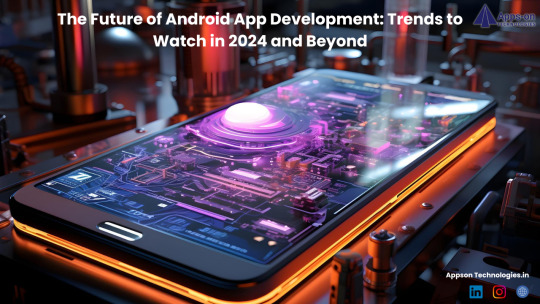
The Android operating system has become synonymous with mobile innovation, powering billions of devices worldwide. As technology continues its relentless march forward, Android app development is poised for an exciting metamorphosis. This article delves into the key trends shaping the future of Android app development, exploring groundbreaking technologies and innovative approaches that will transform how we interact with mobile apps.
The Rise of Artificial Intelligence (AI) and Machine Learning (ML):
AI and ML are no longer relegated to science fiction; they are rapidly becoming the driving force behind intelligent and personalized user experiences. Here's how these technologies will reshape Android app development:
Hyper-Personalization: Gone are the days of generic app experiences. AI-powered apps will leverage user data, preferences, and usage patterns to curate a truly personalized journey. Imagine a news app that proactively recommends articles based on your interests, a fitness tracker that tailors workout plans to your fitness level, or a music streaming service that anticipates your mood and suggests the perfect playlist. Enhanced Functionality: AI can seamlessly integrate into various aspects of app functionality. Voice recognition will allow for natural and intuitive interactions, while AI-powered chatbots can provide real-time customer support or answer user queries in an informative and engaging way. Machine learning algorithms can optimize app performance by analyzing usage data and identifying areas for improvement. Predictive Analytics: By analyzing user behavior, app preferences, and historical data, AI can predict user needs and proactively assist them. Imagine a shopping app that suggests items you might be interested in based on your past purchases or a travel app that anticipates your travel needs and recommends hotels, restaurants, and attractions based on your preferences.
Augmented Reality (AR) and Virtual Reality (VR): Redefining User Experiences
AR and VR are blurring the lines between the physical and digital worlds, offering immersive experiences that were once confined to the realm of entertainment. Here's how these technologies will transform Android apps:
Revolutionizing Gaming: The future of mobile gaming lies in AR and VR. AR games will overlay virtual elements onto your real-world surroundings, creating captivating experiences where fantasy and reality collide. Imagine battling aliens in your living room or embarking on a virtual treasure hunt in your neighborhood park. VR, on the other hand, can transport you entirely to new worlds, offering unparalleled gaming experiences that defy the limitations of traditional displays. Enhanced Learning and Training: AR and VR have the potential to revolutionize education and training. Imagine exploring the human body in 3D detail during biology class or experiencing historical events firsthand through a VR simulation. These technologies can make learning more engaging, interactive, and accessible for people of all ages. Transforming Retail and E-commerce: The way we shop is undergoing a significant shift. Customers can use AR apps to virtually try on clothes or visualize how furniture would look in their homes before making a purchase. VR showrooms can allow customers to explore entire product lines from the comfort of their homes, potentially leading to increased sales and reduced return rates.
The Power of 5G and Edge Computing: A New Era of Connectivity
The arrival of 5G, the next generation of mobile network connectivity, marks a significant leap forward. With its blazing-fast speeds and ultra-low latency, 5G will pave the way for a new era of app experiences:
Real-time Applications: Imagine seamless video streaming without buffering, lag-free online gaming with instantaneous responses, and real-time data synchronization across all your devices. 5G's high bandwidth will make these experiences a reality, transforming how we interact with apps on the go. Cloud-Based Processing: Complex processing tasks can be handled by powerful cloud servers thanks to 5G's capabilities. This frees up resources on your device for a smoother user experience. Imagine editing high-resolution videos on your phone or performing complex scientific simulations directly on your mobile device, all powered by the cloud. The Internet of Things (IoT) Integration: 5G's ability to connect a vast network of smart devices seamlessly will be a game-changer for the Internet of Things (IoT). Android apps can act as central hubs for controlling these devices, creating smarter and more interconnected homes and environments. Imagine using your phone to adjust lighting, monitor energy consumption, or control smart appliances in your home remotely.
Prioritizing User Privacy and Security: A Growing Focus
In today's digital age, user privacy and security are paramount concerns. Google, the developer of the Android operating system, has always emphasized these aspects, and this focus will continue to shape the future of Android app development:
Enhanced Data Protection Features: Expect to see even more robust data encryption methods and user controls over data collection practices within Android apps. Developers will need to be transparent about how user data is collected, stored, and used. This may involve features like allowing users to easily access and manage their data within the app, or offering granular control over permissions granted to the app.
Focus on Biometric Authentication: Fingerprint scanning, facial recognition, and other biometric authentication methods will become increasingly commonplace. These methods provide a more convenient and secure alternative to traditional passwords, allowing users to access apps and protect sensitive information with a simple touch or glance.
Increased Scrutiny of Third-Party Data Sharing: Google is likely to tighten regulations around how apps share user data with third parties. Developers will need to ensure that user data remains secure and is only used for the purposes explicitly consented to by the user. This may involve implementing stricter data sharing agreements with third-party services or providing users with clear and concise information about how their data might be shared.
The Rise of Progressive Web Apps (PWAs): A Hybrid Approach
Progressive Web Apps (PWAs) offer a unique blend of web and mobile app functionalities. They provide a native-like experience, accessible through a web browser, without the need to download an app from the Google Play Store. Here's how PWAs are gaining traction in the Android app development landscape:
Improved Accessibility: PWAs offer a wider reach for developers, as users don't need to download them from the Play Store. This can be particularly beneficial for geographically restricted regions or users with limited storage space on their devices. Users can simply access the PWA through a web browser, ensuring they have the latest version without manual updates. Offline Functionality: PWAs can be designed to work offline, allowing users to access certain features and content even without an internet connection. This can be a major advantage for situations with spotty internet coverage or limited data plans. Imagine using a PWA for note-taking or managing to-do lists even without internet access, with the data syncing to the cloud once you're back online. Reduced Development Costs: Developing a PWA can be more cost-effective compared to creating a fully native Android app. This allows developers to experiment with new ideas and reach a broader audience without a hefty investment. Additionally, PWAs can leverage existing web development skills, potentially streamlining the development process.
The Continued Evolution of Kotlin: A Powerful Programming Language
Kotlin, a modern and expressive programming language, has become the preferred choice for Android app development. Here's how Kotlin will continue to shape the future:
Improved Readability and Maintainability: Kotlin's concise syntax and focus on safety features like null safety checks lead to cleaner and more maintainable code. This translates to fewer bugs, easier collaboration among developers, and a smoother development process. Enhanced Interoperability with Java: Kotlin seamlessly integrates with existing Java codebases, allowing developers to leverage existing libraries and frameworks while writing new code in Kotlin. This smooth integration ensures a more efficient transition to Kotlin for developers with a Java background. Focus on Developer Productivity: Kotlin offers features such as coroutines for asynchronous programming, which simplify writing code for complex tasks and improve overall developer productivity. This allows developers to focus more on creating innovative app features and user experiences.
The Foldable Phone Revolution: A New Form Factor for Android Apps
Foldable phones are no longer a futuristic concept; they are becoming increasingly popular. These devices present a unique challenge and opportunity for app developers:
Adapting to a Changing Screen Size: Apps need to be designed to adapt to the changing screen size of foldable phones seamlessly. This may involve creating layouts that can function effectively in both unfolded and folded states, ensuring an optimal user experience regardless of how the device is being used. Unlocking New Possibilities: The larger screen size of unfolded foldable phones opens doors for innovative app experiences. Imagine using a foldable phone to edit photos with more screen real estate or multitask by having multiple apps open simultaneously on the unfolded display. Collaboration between Developers and Device Manufacturers: Optimizing apps for foldable phones requires close collaboration between developers and device manufacturers. This collaboration will ensure that apps can leverage the unique capabilities of foldable devices and provide users with a seamless experience.
Blockchain Technology: Exploring the Potential
While still in its early stages of exploration within Android app development, blockchain technology holds immense potential for the future:
Enhanced Security and Transparency: Blockchain technology can be used to create secure and transparent data storage solutions. This could be beneficial for apps that handle sensitive user data, such as financial transactions or healthcare information. Decentralized Applications (dApps): Blockchain technology can pave the way for the development of decentralized applications (dApps) on the Android platform. These dApps would be independent of any central authority, potentially offering greater control and privacy to users. New Revenue Models: Blockchain technology could revolutionize in-app purchases and monetization strategies. Imagine using cryptocurrency for in-app purchases or microtransactions within Android apps. Additionally, blockchain could facilitate new models like tokenized rewards or loyalty programs within apps.
The Growing Importance of Accessibility:
Making apps accessible to everyone, regardless of their abilities, is becoming an essential aspect of responsible app development. Here's how accessibility will shape the future:
Focus on Inclusive Design: Developers will need to prioritize features like screen reader compatibility, improved color contrast, and support for alternative input methods (like voice commands or gesture controls). This ensures that users with visual impairments, motor disabilities, or other challenges can interact with apps seamlessly. Compliance with Accessibility Guidelines: Google is likely to place greater emphasis on accessibility standards when reviewing apps for the Play Store. Developers will need to ensure their apps comply with these guidelines to be published and reach a wider audience. A Moral and Business Imperative: Accessibility is not just a technical consideration; it's a moral responsibility. By making apps accessible, developers can tap into a broader user base and create a more inclusive mobile experience for everyone.
The Rise of Low-Code and No-Code Development Platforms:
Low-code and no-code development platforms are simplifying app creation, making it accessible to a wider range of users. Here's how these platforms might impact the future:
Democratizing App Development: These platforms allow individuals with limited coding experience to create basic apps. This opens doors for citizen developers who have great ideas but lack the technical expertise to bring them to life. Focus on Business Logic and User Experience: Low-code and no-code platforms handle the technical complexities of app development, allowing users to focus on the core functionality and user experience of their app. A Potential Disruption for Traditional Developers? While these platforms could streamline app creation for some, they are unlikely to replace traditional developers entirely. Complex apps with advanced features will still require the expertise of experienced developers.
The Future is Bright: A World of Possibilities Awaits
The future of Android app development is brimming with exciting possibilities. From the power of AI and the immersive experiences of AR/VR to the transformative potential of 5G and the ever-evolving landscape of user privacy and security, developers have a treasure trove of tools at their disposal to create apps that are not only feature-rich but also intelligent, intuitive, and deeply personalized. As these trends continue to evolve, we can expect Android apps to become an even more integral part of our daily lives, seamlessly integrated into the fabric of our work, leisure, and overall mobile experience.
Connect Now
Flutter Experts
#technology#tech#android#android app development#android app developer#android app developer company#future#trends#future trends
0 notes
Text
1 note
·
View note
Text
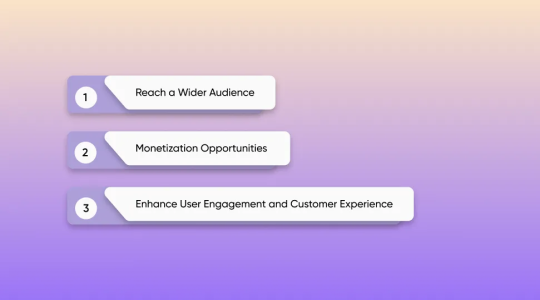
Android app development offers numerous benefits for businesses, including increased brand visibility, expanded customer reach, enhanced customer engagement, and improved sales opportunities.
With a custom Android app, businesses can provide convenient access to products and services, streamline operations, and stay ahead in today's competitive market landscape.
Read Blog here
#android app development#android application development company in chennai#android app developers#android app developer company#android app design#business#strategies#app development#services
0 notes
Text

Take advantage of our IOS App Development solutions to start your digital transformation journey, tailored to your specific business goals and demands. Whether you're developing a brand-new app or improving an old one, our team puts forth endless effort to provide solutions that boost productivity, encourage user engagement, and stimulate business expansion.
#marketing#developers & startups#mobile app development#android app developer company#android app development#mobile app developer company
1 note
·
View note
Text
Unlocking the Potential: Arduino Programming for Beginners

Arduino programming opens up a world of endless possibilities for beginners looking to dive into the exciting realm of electronics and robotics. Whether you're an aspiring engineer, hobbyist, or student, learning Arduino programming can be both rewarding and empowering. In this beginner's guide, we'll explore the fundamentals of Arduino programming, its applications, and how you can get started on your journey towards building your own innovative projects.
What is Arduino?
Arduino is an open-source electronics platform that provides a user-friendly interface for building interactive electronic projects. At its core, Arduino consists of a microcontroller board and a development environment for writing and uploading code to the board. With Arduino, you can create anything from simple LED blinkers to complex robotic systems, making it an ideal platform for beginners and experienced makers alike.
Understanding Arduino Programming:
At the heart of Arduino programming is the Arduino IDE (Integrated Development Environment), a software tool used to write, compile, and upload code to the Arduino board. The language used for Arduino programming is based on C/C++, but it's simplified and tailored for ease of use, making it accessible even to those with limited programming experience.
Getting Started:
Setting up the Arduino IDE: The first step in arduino programming for beginners is to download and install the Arduino IDE from the official website (https://www.arduino.cc/en/Main/Software). Once installed, you'll need to select the appropriate board and port from the Tools menu to establish a connection between your computer and the Arduino board.
Writing Your First Sketch: In Arduino programming, a sketch refers to the code that runs on the Arduino board. A simple "Hello World" example for Arduino involves blinking an LED connected to one of the digital pins on the board. With just a few lines of code, you can control the behavior of the LED, turning it on and off at specified intervals.
Understanding Basic Syntax: Arduino programming syntax is similar to C/C++, consisting of statements, functions, variables, and control structures. Familiarizing yourself with basic programming concepts such as loops, conditionals, and functions will help you write more complex Arduino sketches as you progress.
Exploring Applications:
The versatility of Arduino makes it suitable for a wide range of applications, from home automation and robotics to interactive art and wearable technology. Here are just a few examples of what you can create with Arduino programming:
Home Automation: Use Arduino to automate lights, thermostats, and other appliances in your home, making them smarter and more energy-efficient.
Robotics: Build robotic projects ranging from simple line-following robots to advanced autonomous drones, leveraging Arduino's motor control and sensor integration capabilities.
IoT (Internet of Things): Connect Arduino to the internet and gather data from sensors to monitor environmental conditions, control devices remotely, and create interactive IoT projects.
Interactive Art: Create interactive art installations with Arduino, incorporating sensors, lights, and sound to engage viewers in immersive experiences.
Wearable Technology: Design wearable devices such as fitness trackers, smart watches, and health monitors using Arduino and compatible sensors.
Resources for Beginners:
As you embark on your Arduino programming journey, there are numerous resources available to support your learning:
Online Tutorials: Websites like https://technobotics.in/ offer a wealth of tutorials, guides, and project ideas for beginners and advanced users alike. From basic LED blinking tutorials to advanced robotics projects, you'll find everything you need to kickstart your Arduino journey.
Community Forums: Join online forums and communities such as the Arduino Forum (https://forum.arduino.cc/) to connect with fellow makers, ask questions, and share your projects and experiences.
Books and Guides: Explore beginner-friendly books and guides on Arduino programming available online and in bookstores, providing comprehensive coverage of Arduino fundamentals and project ideas.
Conclusion:
Arduino programming offers a gateway to creativity, innovation, and exploration for beginners eager to delve into the world of electronics and robotics. With its intuitive interface, vast community support, and endless possibilities for experimentation, Arduino empowers individuals of all ages and backgrounds to turn their ideas into reality. Whether you're a student, hobbyist, or aspiring engineer, learning arduino programming for beginners is a journey worth embarking on as you unlock the potential to create, innovate, and inspire. Start your Arduino journey today and see where your imagination takes you!
#robotics courses#android app developer company#stem education#arduino programming courses#robotics courses for kids#robotics#technology#android app agencies#breadboard electronics for beginners#robotics for kids
1 note
·
View note
Text
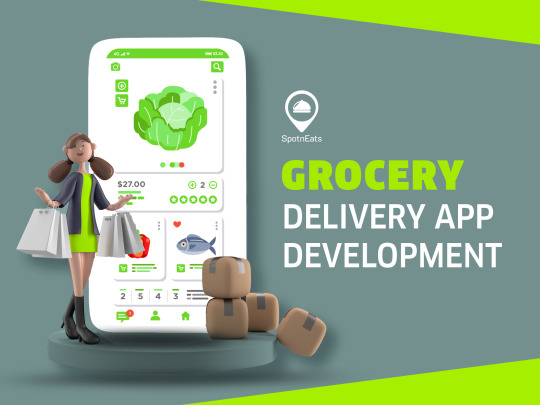
Supercharge your Grocery business with SpotnEats Delivery app development services! Enhance delivery, delight customers, and boost growth.
Visit: https://bit.ly/3qZurgo
#spotneats#software development#android app developer company#mobileappdevelopment#business#startup#grocerydeliverysoftware#groceryorderingsoftware#grocery delivery app script
0 notes
Text
The entire spectrum of hybrid app development provides compelling solutions for businesses working on the maximization of their digital presence. Its advantages include cost-effectiveness and a shorter time to market. The embracement of app development not only revolves around building apps but also transforms the digital experience for both customers and businesses alike.
0 notes